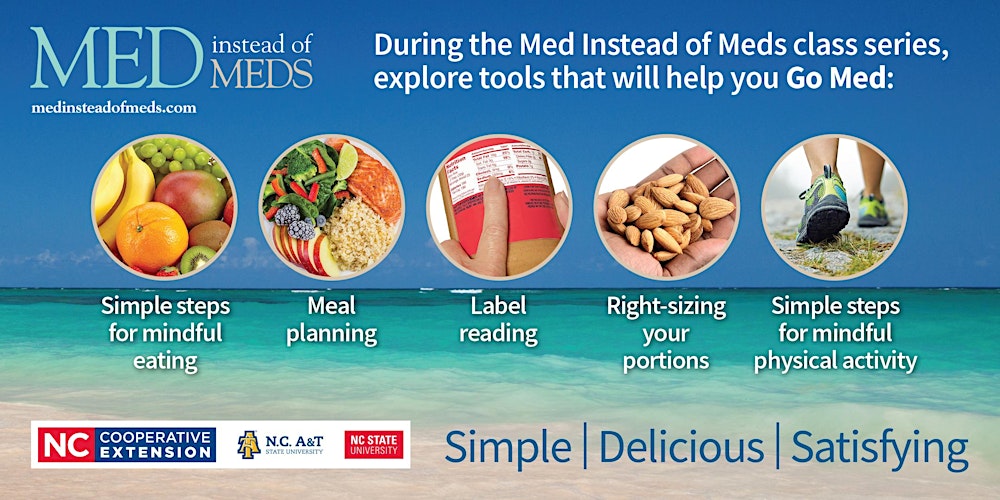Eating the Mediterranean Way
go.ncsu.edu/readext?999742
en Español / em Português
El inglés es el idioma de control de esta página. En la medida en que haya algún conflicto entre la traducción al inglés y la traducción, el inglés prevalece.
Al hacer clic en el enlace de traducción se activa un servicio de traducción gratuito para convertir la página al español. Al igual que con cualquier traducción por Internet, la conversión no es sensible al contexto y puede que no traduzca el texto en su significado original. NC State Extension no garantiza la exactitud del texto traducido. Por favor, tenga en cuenta que algunas aplicaciones y/o servicios pueden no funcionar como se espera cuando se traducen.
Português
Inglês é o idioma de controle desta página. Na medida que haja algum conflito entre o texto original em Inglês e a tradução, o Inglês prevalece.
Ao clicar no link de tradução, um serviço gratuito de tradução será ativado para converter a página para o Português. Como em qualquer tradução pela internet, a conversão não é sensivel ao contexto e pode não ocorrer a tradução para o significado orginal. O serviço de Extensão da Carolina do Norte (NC State Extension) não garante a exatidão do texto traduzido. Por favor, observe que algumas funções ou serviços podem não funcionar como esperado após a tradução.
English
English is the controlling language of this page. To the extent there is any conflict between the English text and the translation, English controls.
Clicking on the translation link activates a free translation service to convert the page to Spanish. As with any Internet translation, the conversion is not context-sensitive and may not translate the text to its original meaning. NC State Extension does not guarantee the accuracy of the translated text. Please note that some applications and/or services may not function as expected when translated.
Collapse ▲I know that we are just at the end of the third week of the New Year and some of you have already given up on eating healthier or you have had a few setbacks. Well do not fear; I am here to assist you with getting back on track and hopefully introduce a new way of eating. It’s called the Med Way.
Eating the Mediterranean way refers to adopting a diet inspired by the traditional dietary patterns of countries bordering the Mediterranean Sea. This diet is often considered healthy and has been associated with various health benefits. The key features of the Mediterranean diet include:
- Eat more Fruits and Vegetables: Fruits, vegetables, whole grains, legumes, nuts, and seeds are central to the diet. Get in at least five servings of fruits and vegetables per day. Choose a variety of colors and eat more of the dark green, leafy vegetables such as collards, kale, spinach, and turnip greens.
- Healthy Fats: Olive oil is a primary source of fat, providing monounsaturated fats. Fish, especially fatty fish like salmon and mackerel, is also a good source of omega-3 fatty acids. Choose olive oil. Replace solid fats (e.g., butter and margarine) and other oils with olive oil. Use olive oil for cooking and in dressings and marinades. Aim to consume at least 4 tablespoons per day, while keeping within your calorie budget.
- Whole Grain Foods: Consumed are whole grain foods such as oatmeal, quinoa, brown rice, and popcorn. When choosing bread and pasta, look for “whole” in the first ingredient on the ingredient list (e.g., “whole grain wheat”).
- Snack on Nuts and Seeds: Poultry, eggs, and lean cuts of meat are included in moderation. Plant-based proteins, such as beans and lentils, are also common.
- Herbs and Spices: The use of herbs and spices instead of salt for flavoring is a characteristic feature.
- Change your Protein: Red meat is consumed sparingly, and processed foods are minimized. Eat seafood at least three times per week. Include fatty fish, such as mackerel and salmon. Avoid fried fish. Eat white-meat poultry, such as turkey and chicken, at least twice a week.
- Regular Physical Activity: The Mediterranean lifestyle also emphasizes regular physical activity. Be physically active with family and friends. Aim to be moderately physically active (e.g., brisk walking) at least 150 minutes per week or 30 minutes per day.
Benefits associated with the Mediterranean diet include heart health, weight management, and a reduced risk of chronic diseases. Eating the Mediterranean way is not only healthy, but also delicious and satisfying. Foods that you once thought of as too high in fat or unhealthy, including nuts, olive oil, olives, and whole grains, become an everyday part of your diet.
If you are interested in learning more about the Med Way of eating, join me for a seven-week class. Join me Wednesdays, February 21 – April 3, 6:00-8:00 p.m. at the Rowan County Center. Each week we will focus on a different food group, sample recipes, and share ways to incorporate the Mediterranean style into your life. I hope you will join me! To sign up, visit https://www.eventbrite.com/e/med-instead-of-meds-tickets-809232936497. The cost for the series is $40.00, and the deadline for signing up is February 16, 2024. Space is limited.
If Med Instead of Meds isn’t your thing, I will also be hosting two Lunch and Learns: Microwave Magic and Super Foods. These will be held on Tuesday, February 27 and Tuesday, March 26 at noon. Sessions are $10.00 each. I look forward to seeing you soon!
Toi N. Degree, Associate Family & Consumer Education Agent with North Carolina Cooperative Extension. Toi may be reached by phone at 704-216-8970 or by email at toi_degree@ncsu.edu.





